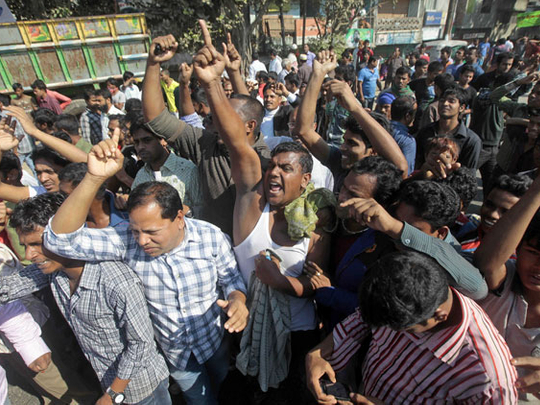
Dhaka: Three people died as Bangladesh opposition supporters went on the rampage on Tuesday, blocking roads and ripping up railway tracks after rejecting plans for a January 5 election, plunging the nation into fresh political turmoil.
The Bangladesh Nationalist Party (BNP) and its Islamist allies called a 48-hour nationwide blockade to press their demand for a suspension of the poll announced on national television on Monday evening.
The BNP has been calling for Prime Minister Shaikh Hasina to resign and make way for a neutral caretaker government to oversee the elections — demands rejected by Hasina and her party.
Railway links between Dhaka and Chittagong and northeastern Sylhet were cut off in protest against the “election of farce”, prompting authorities to send paramilitary BGB troops to guard the capital and other major cities.
Chief election commissioner Kazi Rakibuddin Ahmad’s announcement on Monday pushed the country’s volatile politics to a more intricate phase pitting ruling Awami League against BNP, which demanded the poll plan be shelved until the settlement of the dispute over a transitional government.
However, Ahmad said the elections authority had waited for the major parties to reach an understanding over their disputes “but now we don’t have time to delay further” as the commission was obligated to hold the polls within January 24, 2014 under a constitutional deadline.
“We repeatedly urged the major parties so that they reach a consensus to fulfil the nation’s expectations, we still hope they will not ignore the expectations,” Ahmad said.
According to the schedule, December 2 is the last date for submission of nomination papers, meaning the opposition must decide its stance on the polls and nominate candidates within a week.
Immediately after the schedule was announced, senior opposition leaders flocked to BNP chief and ex-prime minister Khaleda Zia’s Gulshan office.
“We demand the polls schedule be held back until the crisis over the election-time government is resolved,” the party’s acting secretary-general Mirza Fakhrul Islam Alamgir said at a media conference held after the meeting.
The opposition has been spearheading a street campaign demanding formation of a “non-party” government for election oversight with an “acceptable” person as its head instead of Prime Minister Shaikh Hasina against the premier’s call to join.
Deadly clashes claimed at least 31 lives in the past three weeks, while the violent demonstrations saw hospitals filled up with scores of wounded patients mostly with burn injuries as protesters torched over 500 vehicles.
Leading civil society figures urged the major two parties to make their final efforts to reach a consensus while the Indian and US envoys in Dhaka said they were expecting Bangladesh to witness a credible election.
Hours ahead of the announcement of the schedule, Indian High Commissioner in Dhaka Pankaj Saran expressed hope that the election process would strenghten democratic institutions and processes in Bangladesh.
“As a neighbour and well-wisher, we hope that in the coming weeks and in the run-up to the election, the democratic institutions and process will be strengthened,” Saran said emerging from a courtesy call on the new foreign minister of the polls-time “multiparty” government, Abul Hassan Mahamood Ali.
US ambassador in Dhaka Dan W. Mozena said “the process of the election schedule makes the dialogue more urgent between the two political camps” as he emerged from a similar visit to the minister.
Bangladesh last week reconstituted the cabinet to form an election-time “all-party” government dropping 30 ministers of the ruling Awami League-led alliance but BNP declined to join the interim cabinet.
Hasina yesterday said her invitation for the BNP to join the interim government still stands.
“Despite having 90 per cent seats in the Jatiya Sangsad, I call upon the opposition to join the polls-time interim government so that no doubt can arise [from] the election,” the premier told a rally yesterday of her ruling Awami League’s nomination seekers.
“Send names of your party lawmakers, they will be given portfolios whichever you want ... let us join hands to stage a peaceful and credible election,” Hasina added.
The BNP had earlier called the all-party cabinet a farce saying elections under Hasina would not be credible as it threatened to boycott the polls if its demands were ignored.
Earlier on November 19, Zia, along with a 20-member delegation of the BNP-led 18-party alliance, called on President Abdul Hamid and sought his intervention to end the deadlock over elections, which sparked deadly clashes that have claimed at least 31 lives across Bangladesh.
Bangabhaban presidential palace sources at that time said Hamid told Zia that, under the constitution, he had little authority to intervene to break the deadlock but promised to convey the opposition message to the government and expected that the two parties could resolve their disputes through discussions.












